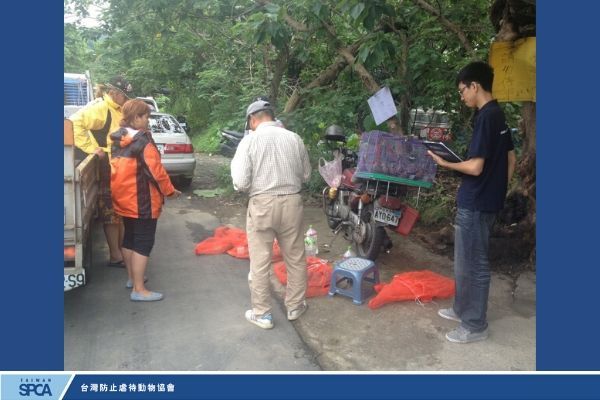
2013年10月1號下午,Taiwan SPCA在新店山區發現有業者在路邊違法販賣放生鳥。現場可見數個紅網中各裝入數十隻鳥,不但過度擁擠且毫無遮蔽的被放置在大馬路邊。TSPCA專員便立即通知警方和新北市動保處到現場協助。
現場共有60隻紅鳩、兩隻珠頸斑鳩和四隻八哥鳥。業者卻只針對部分鳥隻有提供飲水及食物。所有鳥皆無遮陽避雨的遮蔽處,且被擺放在車多吵雜的水泥馬路邊上。檢視外觀及健康狀況,看似都沒有問題。詢問後,業者更表示66隻鳥是使用一個鳥籠並經由機車來運送,鳥籠及機車卻未設置任何在行車時可以遮風的措施。比對隻數後,甚至發現由攤販所提供鳥類的來源證明收據和現場數量明顯不符。由於部分動物來源不明,加上業者說詞反覆,TSPCA便立刻要求新北市動保處應沒入兩隻沒有登記的珠頸斑鳩,但新北市動保處表示依目前法律規定僅要求攤販當天稍晚傳真收據即可。(目前動保處所依據的購票證明,其實只是簡易的收據,並也沒有足夠的資訊來識別現場的動物是否就是收據上所載明的動物。)
由於現場情況並沒有違反野生動物保育法,針對違反動物保護法「未給予妥善照顧」此點,動保處也只能勸導。本協會針對動物福利部分,在現場反覆提醒及要求該業者在販賣動物時,應選擇合法且安靜的地方來減少鳥類的緊迫、應提供寬敞的籠子和遮避處、乾淨充足的食物和飲水、在運送時也必須提供減少動物壓力的設備。至少在這個不合理的買賣中,業者必須善待牠們並希望能藉此提升業者對動物福利的知識。到場員警則依”道路交通管理處罰條例”針對路邊違法擺攤,現場處以新臺幣1200至1500元罰鍰。
放生鳥是在台灣已存在很久的動物福利問題,儘管法律上有許多漏洞及不明確,Taiwan SPCA仍努力地與各地方縣市防疫所/動保處溝通及討論更完善的執法辦法。在此,我們也再次呼籲民眾,不要再購買放生鳥。鳥是野生動物,在天空飛翔才是牠們的生活,宗教原因的買賣只會助長更多的鳥類被獵捕及商業行為的放生。若在路邊看到有業者販賣放生鳥,應該要立即撥打110報警或連絡動保處,讓攤販、動保處及警方了解有許多人正為這些鳥兒努力、關心這些動物。即使是合法買賣,我們及任何人也都有權要求及確定業者是否有提供符合動物福利的照顧。(民眾若發現放生鳥,請參考以下照片之臺北市動保處處理流程)
In the afternoon of October 1st 2013, Taiwan SPCA came across a man illegally selling birds in the Xindian area. The man had several red-netted bags on the ground, full of birds. They were not only kept in an overcrowded space, but also situated on the sidewalk without any shade or shelter. As a result, the TSPCA investigation team immediately contacted The New Taipei City Animal Protection Office (APO) and police for further assistance.
The man had a total of 66 birds, amongst which included 60 Red Turtle Doves, 4 Spotted Doves and 2 Starling Birds. Only a few of the birds were provided with food and water and none were given proper shelter from the elements. In fact, they were sitting on the concrete sidewalk right next to heavy traffic, vehicle pollution and noise. However, after a closer look, no serious physical injuries to the birds were found. It was revealed that all 66 birds were crammed together during transportation on the back of a small scooter, which wasn’t equipped to protect the animals from the wind, rain, heat or sunshine.
Upon further inspection TSPCA discovered that the total number of birds in the man’s possession did not match the numbers he provided on his written records, which should also clearly state the origin of the birds. Suspicions grew stronger. Thus, we insisted that New Taipei APO confiscate the two Starling Birds that did not appear in the man’s records. Sadly, in response to our urgent request, the government officials explained that if the vendor could fax proof of the Starlings origin at a later date, he would not be breaking any laws. (To our disappointment, the current method to prove origin New Taipei APO requires is only a hand written receipt. These receipts can be easily altered and do not necessarily prove the species or origin of the animal).
As the vendor’s act of selling captive birds did not violate the Wildlife Conservation Act, the most New Taipei APO could do was to persuade the vendor to provide more appropriate housing for the birds. The Taiwan SPCA strongly addressed the welfare concerns to both the vendor and APO and urged him to comply with the following guidelines: 1) provide a safe environment to reduce the birds’ stress level, 2) provide a more spacious environment and proper shading, 3) provide ample food and clean water 4) utilize proper transport equipment to aid in stress reduction.
TSPCA were strict about the demands as a way to make clear to the vendor that he must provide a higher level of animal welfare for the birds, and to educate him regarding the proper and improper ways to care for the animals. In the end the man was fined $1,200-1,500 NTD for “hindering traffic flow” and conducting illegal business on the street.
The traditional religious beliefs regarding the releasing of captive birds have been an on-going animal welfare issue for some time. The current animal protection laws in Taiwan sadly have many loopholes, therefore the TSPCA works tirelessly with city and county animal protection offices around the island to strengthen the management of vendors such as these.
We strongly urge the public not to purchase captive birds. They are winged animals that belong in the sky and have the right to fly freely. Purchasing captive birds for the sake of fulfilling religious rituals only increases the numbers of captured wildlife, as a higher demand drives a greater supply.
Should you see vendors selling captive birds, please call 110 immediately to report these illegal activities to the local police or inform your local animal protection office. The public always has the right to voice their concern about the welfare issues of illegal and legal animal sales.
Should you come across any suspicious activity regarding the sale of captive birds, please refer to the flow chart below provided by Taipei City APO.
動保法小常識:
動物保護法 第 5 條:
動物之飼主,以年滿二十歲者為限。未滿二十歲者飼養動物,以其法定代理人或法定監護人為飼主。飼主對於其管領之動物,應依下列規定辦理:
一、提供適當之食物、飲水及充足之活動空間。
二、注意其生活環境之安全、遮蔽、通風、光照、溫度及清潔。
三、提供法定動物傳染病之必要防治。
四、避免其遭受惡意或無故之騷擾、虐待或傷害。
五、提供其他妥善之照顧。
飼主飼養之動物,除得送交動物收容處所或直轄市、縣(市)主管機關指定之場所收容處理外,不得棄養。

